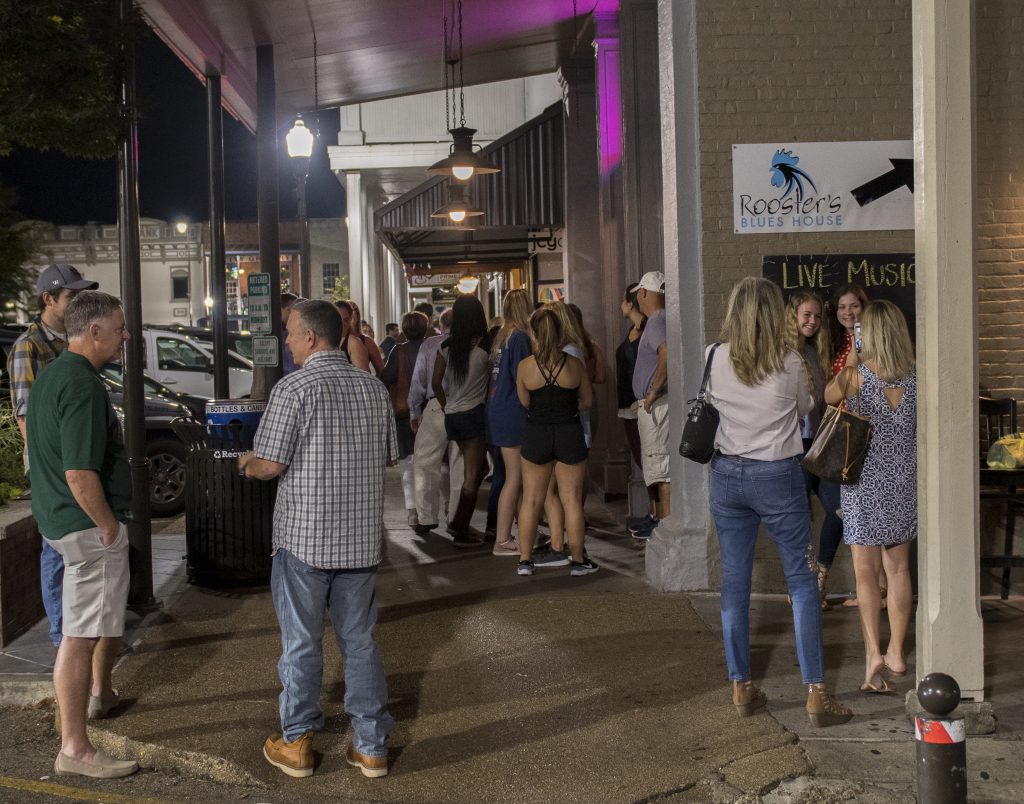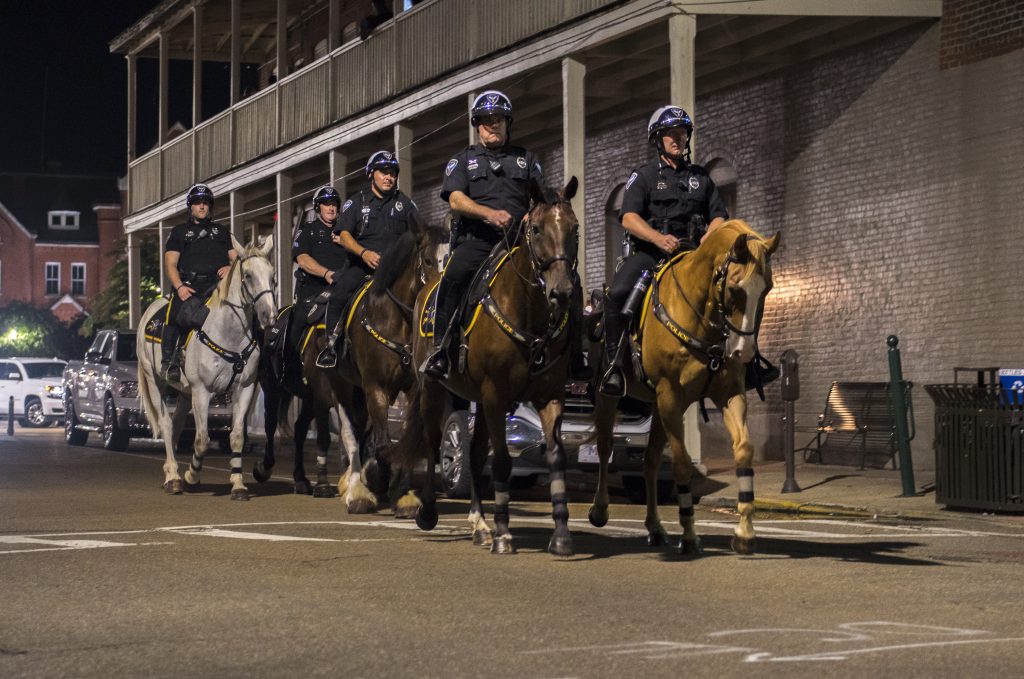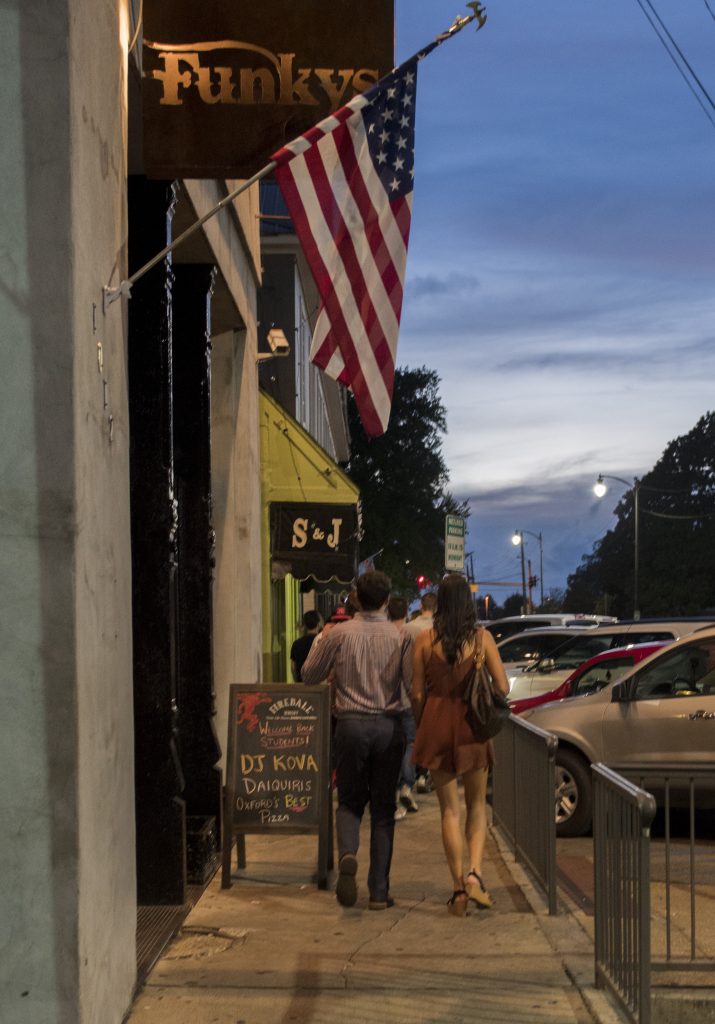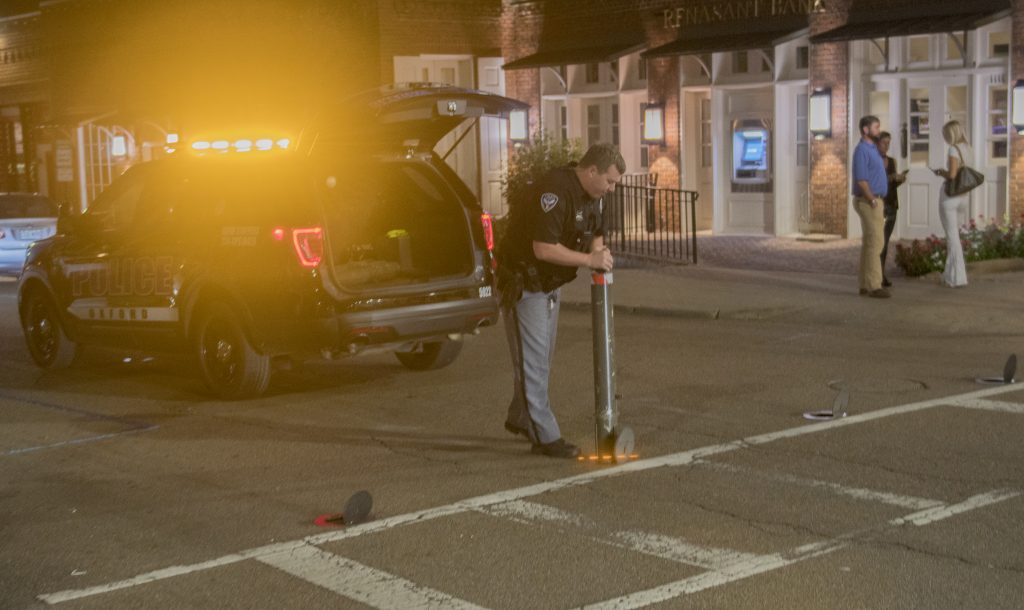The Oxford Board of Aldermen plans to vote on the publicly scrutinized “alcohol and security” ordinance at Tuesday night’s meeting, signaling a conclusion of the months-long series of public hearings and proposed drafts since the ordinance’s first introduction in June.
The vote comes at a time during which Oxford officials are trying to manage the city’s and university’s growth while maintaining Oxford’s familiar level of public safety. The ordinance has been openly criticized by groups claiming that the proposed laws could be wielded to enforce racial biases and promote a message of exclusivity on the Square. City officials have rejected such claims.

A crowd forms outside of many of the bars on The Square on the Friday night before the fall semester begins. Photo by Christian Johnson
Bradley Bishop, owner of The Lyric Oxford, has been one of the most critical opponents of the ordinance. He said that some of the sections in the ordinance specifically target his business.
“We are the only (Alcohol Beverage Control) permitted business that would be required to give notice to law enforcement of when we open,” Bishop said. “Simultaneously, we will be required to pay a $75 processing fee every time we have an event over 150 people. Prior drafts would have required The Lyric to seek a permit from law enforcement and have artists and renters subject to background checks.”
Bishop said the ordinance has been improved since it was first introduced in May, but he claims that it still contains bias.
“We want the Lyric to be a place that is socially available to all people,” Bishop said. “We’ve certainly had people tell us ‘The Lyric is one of few places on the Square where minorities can gather.’ I don’t think this ordinance does anything to address what type of public space we, as a community, want the Square to be. That was a missed opportunity.”
Oxford Mayor Robyn Tannehill denied the claims of racism and invasion of privacy and said numerous task forces that involved people from the university, city and county have taken place “over the past 15 or 20 years.”
“I do not believe that any member of this Board, or any member of the numerous committees and task forces who have proposed these changes and more, did so for any “racist” reason, or with a racist result,” Tannehill said. “I simply reject that. As it currently stands, many restaurant and bar owners have applauded the City and its thoughtful consideration of the ordinance, and support it in its current form.”

Oxford’s Mounted Police division patrols The Square on Friday night. Photo by Christian Johnson
Some citizens stand by the belief that the proposed ordinance has a racial bias and could lead to discrimination. Lifelong Oxonian Ruby Kelley said that she wants the Square to be safe but that she opposes the ordinance in its current form because some parts of the ordinance can be viewed as an invasion of privacy and as having a racial bias.
Kelley said a lot of issues in the safety ordinance debate stem from a lack of minority businesses on the Square and from the board of aldermen not listening to citizens when making decisions.
“The way I think it can be achieved is getting more minority businesses on the Square,” Kelley said. “And in the past, there were more minority businesses on the Square. But because the tax base got more expensive, minority businesses have left the Square.”
Kelley said the ordinance violates citizens’ privacy because business owners must, in the ordinance’s current wording, allow police officials who desire to review businesses’ camera footage to do so.

The Square fills up with bar goers on the Friday night before the fall semester. Photo by Christian Johnson
City attorney Pope Mallette clarified the city’s access to camera feeds in a letter regarding the legality of the ordinance to attorney Robert McDuff of Jackson.
“The city has no interest in the content of the venue’s events, nor does it prefer some content over another,” the letter said. “Related, I take issue with the suggestion that the ‘government is monitoring or filming the proceedings’ at The Lyric or would do so under the ordinance. These are not CCTV connections, nor can camera recordings be obtained without a lawful order, presumably a warrant or subpoena or similar vehicle.”
Bishop’s mother, Linda Bishop, compared Oxford’s ordinance to a similar proposed ordinance in New Orleans. The latter would have required businesses that serve alcohol to install real-time cameras on their interiors.
In response, the Music and Culture Coalition of New Orleans did a study of the top 50 largest cities in the country to examine their security camera laws and discovered that some cities require businesses to install cameras on their exteriors but that no other city in the country required businesses to install cameras on their interiors. After New Orleans officials reviewed the study, the ordinance was withdrawn.
The city of Oxford is proposing a requirement similar to that of the proposed New Orleans ordinance by requiring the installation of cameras on the interiors of all restaurants that have a permit to serve alcohol.
Linda Bishop said “no one else in the country has security camera laws like this.”
She also said she contacted the Mississippi Restaurant Association to see if there were any laws similar to the one being proposed in Oxford and found none.
“It’s just so frustrating that the city is ignoring the fact that there will be legal solutions and costs to the city because they can’t seem to back off,” she said. “No one is against safety. No one is against getting things right. What we’re against is being demanded to do things when there’s no research and no documentation to justify these laws.”
Vice President of Finance for Rust College and Oxford resident Don Manning-Miller has also spoken out against the ordinance because “the Square is often seen as unwelcome territory for a lot of minority students,” and the ordinance does not help with that.
He said the Mississippi chapter of the American Civil Liberties Union and the Mississippi Center for Justice are planning to challenge the ordinance if it passes.
Vice Chancellor for Student Affairs Brandi Hephner Labanc issued a statement on Friday in support of the ordinance.
“The current proposed ordinance implements rules and requirement for restaurants, bars and similar businesses that will augment the university’s goals related to student safety,” Hephner Labanc said. “We applaud the community for providing input and perspective, and we support the Mayor and aldermen’s response to constituents and business owners that led to the current proposed ordinance.”

An Oxford Police officer sets up bollards to close Jackson Avenue in front of Boure. OPD will now be closing the road from 8:00 pm until 1:00 am every Thursday, Friday and Saturday. Photo by Christian Johnson






